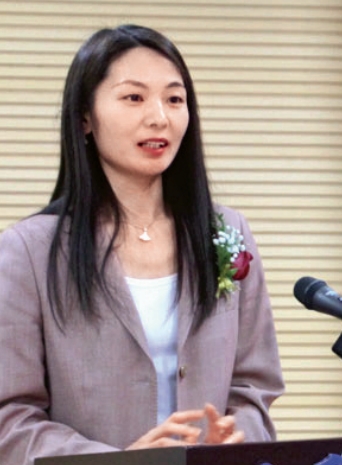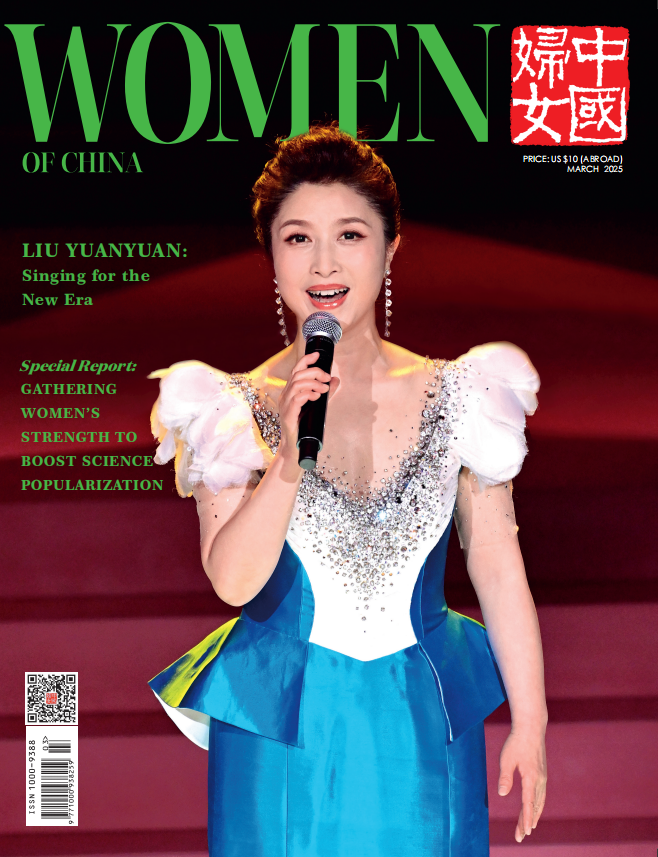Spring Bud Blooms | Entrepreneur Remains Grateful, Spreads Love to Others
Editor's Note
With the care of the Communist Party of China (CPC) Central Committee, and under the leadership of the All-China Women's Federation (ACWF), the China Children and Teenagers' Fund (CCTF) launched the Spring Bud Project in 1989, to improve the education of girls from disadvantaged families. Since the 18th CPC National Congress, in 2012, CCTF has implemented the Spring Bud Project — Dream of Future Action, and it has conducted various activities focused on girls' education, safety and health. For more than 30 years, the Spring Bud Project has offered care and support to about 4.2 million in-need girls. After they receive support from the project, the Spring Bud girls never forget to give back to society. With love and concrete actions, the girls have demonstrated the Spring Bud spirit of unremitting self-improvement, striving for excellence, developing stronger virtues and pursuing better lives. Women of China introduced a section, Spring Bud Blooms, to share stories about Spring Bud girls who have grown up and become contributing members of society, and to encourage society to care for the development of girls. Wang Peiling is among them.

"The Spring Bud Project gave me an opportunity to receive a higher education in Beijing, and it helped me expand my horizons and foster a firm belief that where there's a will, there's a way. It inspired me to grasp the opportunities available, and to eventually achieve what I have today," Wang Peiling says. She adds she is grateful for those people who have helped her, and she vows to do her utmost to pass on the love and warmth to needy individuals.
Wang comes from a rural family in Yuexi County, in East China's Anhui Province. When she was 5, her mother was left physically challenged, the result of an accident, which made life more difficult for the family. Wang's brother and sister dropped out of school to help ease the economic burdens on the family, and they supported Wang so she could stay in school.
Wang studied hard at school. In 2001, she wrote the national college-entrance examination. But she considered giving up the opportunity to attend college because of her family's economic burdens.
Around that time, the Spring Bud Project entered Wang's life. After being recommended by her high school teachers, Wang received the opportunity to study in a Spring Bud class at Beijing Bailie University.
Supported by the All-China Women's Federation (ACWF) and the China Children and Teenagers' Fund (CCTF), Beijing Bailie University became a partner of the project, and in 2001 it established the first college-level Spring Bud class among the country's higher-education institutions.
To date, the university has held seven Spring Bud classes, and it has helped 236 disadvantaged students, with outstanding academic performances, complete their college studies.
Despite having attended the university nearly two decades ago, Wang still vividly remembers her social and academic life at the school. She remembers that all of the students in the Spring Bud class studied hard, and helped each other when they encountered difficulties, whether in their studies or extracurricular activities.
When asked how the project helped her the most, Wang says studying in Beijing expanded her horizons and helped her forge new strength and greater determination to realize her dreams.
While she was a student at Beijing Bailie University, the university often arranged for the students to visit scenic areas, museums and former residences of famous people in the capital.
In 2004, after she graduated from the university, Wang landed a job with a trade company in Beijing. She worked for that company for six years, until a friend encouraged her to open an international trade company, as partners, in 2010.
The biggest headache for Wang and her colleagues was figuring out how to gain sufficient client resources during the early days of the company. At that time, they often visited more than 10 enterprises in a day, and they only clinched business deals after several rounds of talks with an enterprise.
Thanks to their concerted and unremitting efforts, the company has grown from a small office, with about 20 employees, to an influential firm, with more than 200 workers.
Wang attributes her business success to her experiences as a student in the Spring Bud class, where she learned to cherish all employment opportunities available, and not to give up when she encounters difficulties.
During her spare time, Wang participates in public-welfare activities, and she does her utmost to help girls who live in difficulties, as she did at one time.
On December 21, 2021, Wang was invited to attend the opening ceremony of a new Spring Bud class at the university. She talked with attendees about her experiences.
"I am greatly touched by the commitment made by charity-minded individuals to assist disadvantaged girls in the completion of their academic studies over the past decades," Wang said. She added she and her former classmates had raised money to help the Spring Bud girls at the university.
Wang's company has signed a cooperation deal with Beijing Bailie University, to provide its graduates with training and internship opportunities. Wang says she and her colleagues are supportive of the cooperation agreement, and they offered prospective graduates of the Spring Bud class employment guidance this September.
Women make up the majority of her employees. Wang is fully aware of the difficulties career women have in trying to strike a balance between work and family. Therefore, her employees are allowed to adopt flexible work schedules, as long as they finish their assignments.
Wang says her accomplishments fail to compare with the help and benefits she received from others, and that is why she remains grateful for those who have helped her. That also is the reason Wang does her utmost to pass on love to others.
Source: CCTF
(Women of China English Monthly December 2023 issue)
Please understand that womenofchina.cn,a non-profit, information-communication website, cannot reach every writer before using articles and images. For copyright issues, please contact us by emailing: website@womenofchina.cn. The articles published and opinions expressed on this website represent the opinions of writers and are not necessarily shared by womenofchina.cn.








.jpg)

 WeChat
WeChat Weibo
Weibo 京公网安备 11010102004314号
京公网安备 11010102004314号